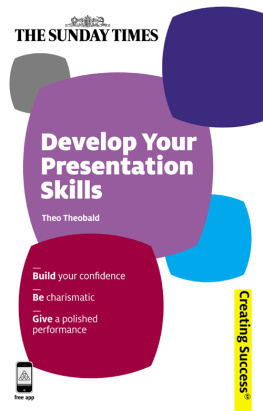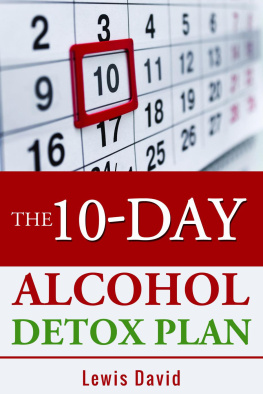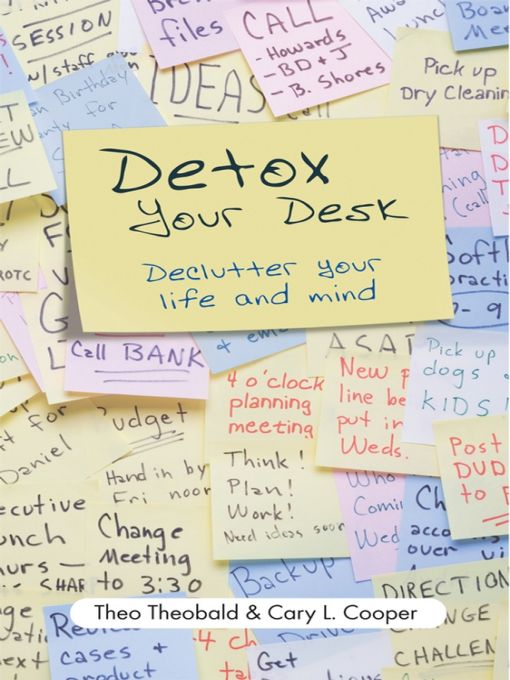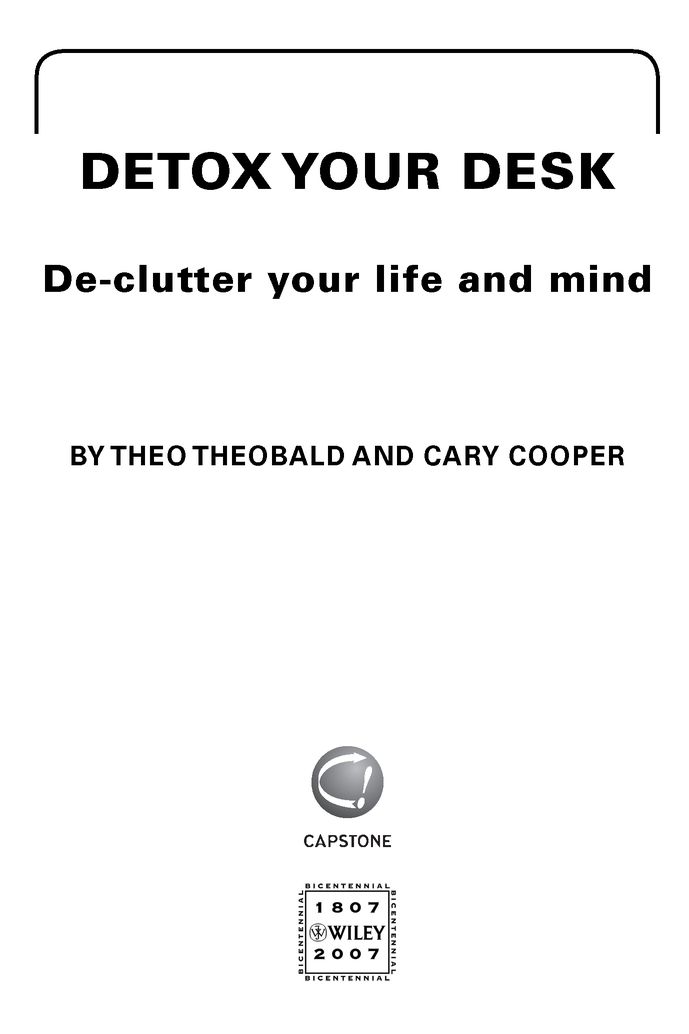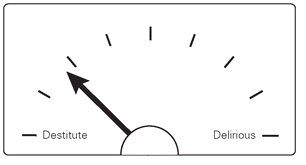Table of Contents
This book is dedicated to the terminally
untidy
(thats most of us!)
The authors would like to thank and, acknowledge the input of loved ones, friends, acquaintances, business thinkers, academics and everyone else who knows us, for their honesty, wit, wisdom and anecdotes that have made this a pleasure to compile.
ABOUT THE AUTHORS
Theo Theobald and Cary Cooper must be one of the oddest pairings in publishing. A Californian academic and media-darling and a streetwise Scouser with quick wit, a no-nonsense approach and a business network to die for.
Theo Theobald is a freelance writer and sometime business professional, with a career that includes BBC management and advertising copywriting. He now runs his own company, Shocktactic Limited, writing and lecturing on management, lifestyle and human interaction. He describes himself as tirelessly enthusiastic and endlessly optimistic and admits that this can be a bit irritating.
Cary Cooper, CBE, is Professor of Organizational Psychology and Health at Lancaster University Management School, and Pro Vice Chancellor of Lancaster University. He is President of the British Association of Counselling and Psychotherapy, former President of the British Academy of Management, a Patron of the National Phobic Society and an Ambassador of The Samaritans. He is the author of numerous books and scholarly articles. He was awarded the CBE in the Queens Birthday Honours List in 2001 for his contribution to organizational health.
INTRODUCTION
This isnt a self-help book and heres why: self-help is for people with time on their hands, time to stop and consider what their faults are and how wonderful the future will be when theyve finished reading the latest book of promises.
Most of us dont have that time, so weve written this book to save you doing all the work that most self-help relies on; its more like we-help. Weve drawn on the experience of business leaders and academics; more important than that, weve spoken to proper workers, the people who do the jobs that keep our organizations running and, based on their issues and experiences, weve constructed a 10-day detox programme, so that you dont have to. All you need to do is follow the actions weve devised on a daily basis and youll find you will work more efficiently. The inevitable (and desirable) consequence of this is that you will find some time for yourself again, time to do things you want, which wed guess isnt reading self-help.
The added difficulty with most other programmes is that theyre a lot like horoscopes. Some people believe religiously in them; others treat them with scepticism; and then there are those who claim to be disbelievers but sneak a look whenever they get the chance (its also true that if they find something they dont like very much, they pretend it doesnt apply to them!).
The success of Detox your Desk isnt defined by the level of trust you put in it; its a set of factual statements and practical actions that work. There is no clever interpretation or spin, no smoke and mirrors or bottled snake-oil, just common sense.
Most other books will tell you that your unfulfilled potential is limitless, that you can become President, or fly to the moon, if youd just believe. You might be lulled into a state of misery about the huge gulf between where you are now and where any self-respecting citizen of the workplace should rightly aspire to be. But, for most of us, this just isnt true, the gulf doesnt exist; usually our dreams are just out of reach: if only we had a bit more money, more time, more influence, more love
Detox your Desk doesnt made huge promises; its just a way of getting more out of your working day, increasing your productivity, maximizing your efficiency and allowing you to go home on time.
Thats all, but for most of us, thats enough.
What we say is that the things which drag most of us down, sap our energy day after day and stop us reaching our potential are nothing more than minor dissatisfactions, not huge crisis issues.
Its not that were actively unhappy; were just passively pissed off.
The sources of mild modern misery are usually fairly few and most of us share the same ones. Youd have thought we would have found an answer to them by now, but just like the common cold, the cure is more elusive than wed like.
What is it that detoxing your desk could do which you might not have found anywhere else? There are three key elements that drive the success of the programme: firstly, the idea of operating in a tidy, strictly ordered, zero tolerance workspace is part of the answer - detox is also about a philosophy. Our desk or workspace is symbolic of our lives as a whole. The way we choose to operate during the time-consuming and important portion of our lives called work sets the tone for how we are as people, so its up to us to make the right choices.
Secondly, theres a recognition that while everyone is different, our ability to sort our desks (and lives) out is equal: all we need is the motivation and the tools. If you claim that youre not a naturally tidy person, it doesnt matter, because detox isnt about personality, its about procedure.
If you were unfortunate enough to need heart by-pass surgery, youd hope that the surgeon had good people skills, allied to a bedside manner that was reassuring, but more important to you than their personality is their ability to stick to the procedure. How would we feel if they suddenly decided to get all creative and blue-sky thinking halfway through our op? I tell you what nurse, this time, just to see what happens, why dont we try attaching the tube for the left ventricle into the hole for the aorta? No thanks.
Procedure is about doing the same things the same way, every time you do them, every single time you do them; something which is not only heartening if youre under the surgeons knife (no pun intended), but also when it comes to detoxing. So, you neednt feel that the process youre about to undergo will turn you into some kind of tidying-up robot; your personality is still free to exercise itself in whatever eccentric ways you choose. Its just that now youll be able to do it in a well organized environment, with more time on your hands.
The third important element is that of inter-connectivity, the blindingly obvious fact that everything we do has an impact on everything else. You can prove this to yourself by making up your own why test, which starts with a general rating of dissatisfaction.
Mentally move the arrow to the position that best sums up your level of satisfaction at work
If youre even mildly dissatisfied, think about why, then connect your answers together. It might look something similar to this:
Im dissatisfied at work.
Why?
Reason 1: Because I have no energy any more.
Why?
Reason 2: Because Im constantly stressed.
Why?
Reason 3: My stress is driven by guilt.
Why?


